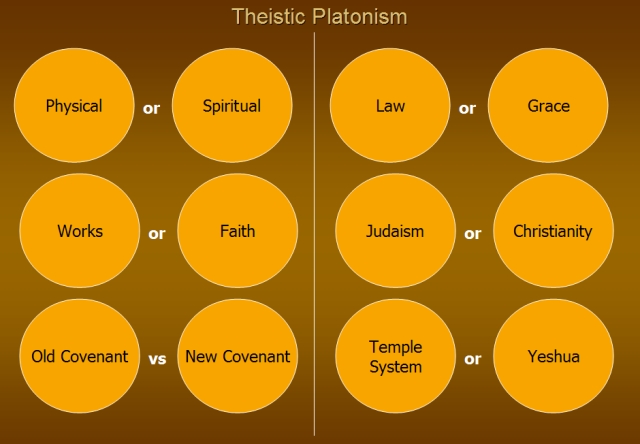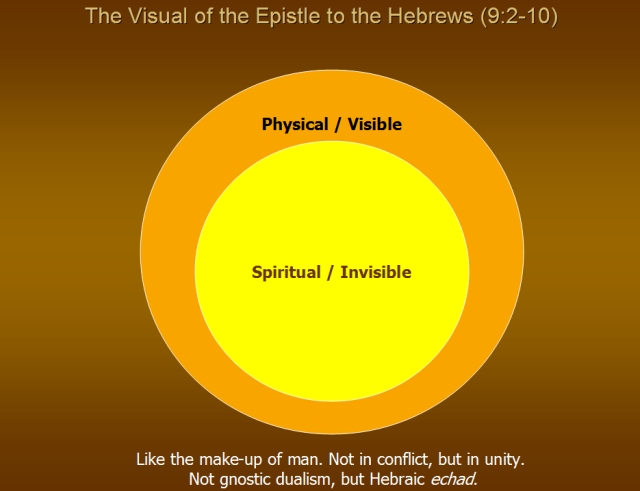Introduction
The "Problem" with this Book
“For if the blood of bulls and goats and the ashes of a heifer, sprinkling the unclean, sanctifies [present, active, indicative] for the purifying of the flesh, how much more shall the blood of Messiah, who through the eternal Spirit offered Himself without spot to G-d, cleanse [future, active, indicative] your conscience from dead works to serve the living G-d?” Hebrews 9:13-14
Approach to Scripture
- Many people approach Scripture as if apparent contradictions must be resolved by ‘dispensations’ or ‘spiritualizing’. When they read something in the Apostolic Scriptures that seems to contradict something in the Hebrew Scriptures, they sometimes assume it is caused by a ‘before Yeshua’ dispensation. This is applying a theology to Scripture, instead of the other way around.
- In this study, we will treat Scripture as containing a single message. We will make the fair assumption that what comes later contains more detail – but what was written earliest is the foundation.
- We will approach apparent contradictions as divine bookmarks – to ask the questions where He will teach us deeper truths.
Yom Kippur
- Lev 16:29-34:
- It provides atonement for the Tabernacle, the priests, all Israel.
- It cleanses you (plural).
- It provides atonement for cleansing sin.
- It is an everlasting statute.
- Lev 23:27-32:
- Holy convocation.
- Afflict your souls.
- Offering made by fire.
- Sabbath rest – no work
- A statute forever.
The Problem with Hebrews
- The apparent contradictions are immediately evident.
- Heb 10:1-4 (in reference to Yom Kippur):
- Yom Kippur sacrifices cannot make perfect.
- Not possible for the blood of the Yom Kippur sacrifices to take away sin.
- Notice what appears to be direct contradictions to the Torah.
- Either Hebrews is wrong, or our understanding is wrong.
- Dispensationalism is usually used to explain this all away. By making up a theology to deal with things like this, we will always miss the point. This is here for us to ask the question!
- Here is one reason why dispensationalism does not work. The same apparent contradiction is found in Hebrews chapter 9.
- 9:13 (present tense) appears to contradict 10:4 (present tense).
Theology Cannot Unlock the Epistle to the Hebrews
- Except for short quotes, Hebrews is largely ignored by many believers. Believing that they know all about Messiah, they feel they no longer need the ‘shadows’ to reveal Him.
- Hebrews 10:1: A shadow is an outline – a shape of the substance. To those who think they do not need the shadow any longer, “Have you seen Him? Do you know everything about Him?”
- The ‘shadow’ is a deprecating term in theology. Matthew Henry refers to the ‘Old Testament’ as a ‘dark dispensation’ and repeatedly makes denigrating statements. His position is the majority.
- Such dismissive thinking will never discover the deep truths and interrelationship between the Covenants and the New Covenant.
Philosophy Cannot Unlock the Epistle to the Hebrews
- The second and third generation believers in the 2 nd Century and following were not Jewish, but Gentile. They had extensive exposure to Greek philosophy. They used their philosophical background to explain away their connection to the people of Israel and the Covenants.
- Their philosophical approach is the foundation for most of the theological explanations of the Bible. They used pagan dualism to read and interpret the Hebrew Scriptures. This is a type of ‘Theistic Platonism’.
- This approach will explain Hebrews away in ‘either/or’ contrasts – thereby missing the main literary devise used throughout the book: kal v’chomer – ‘light to heavy’.


Context
- Anachronisms will only confuse us. The traditional approach to this book is rife with them. An anachronism is looking at an ancient past with today’s eyes.
- We must always use context. We can never erase our modern bias – but we should always try the more.
- We could use encyclopedias or history books for context, but the best context is the Book of Acts. We will use it extensively.
Some Questions
- Some of the questions we will discover are not even normally asked, because people assume they know the answer. For instance:
- What was the purpose of the Tabernacle/Temple?
- What was the purpose of the sacrifices – and why are they not ‘done away with’?
- How did the ancients ‘get saved’?
- What is the connection between the ‘Old Covenant’ and the ‘New Covenant’? And when did the ‘New Covenant’ begin?
- How did the early believers view themselves – as members of a new religion, or not?
- What does all this have to do with the ‘World to Come’?